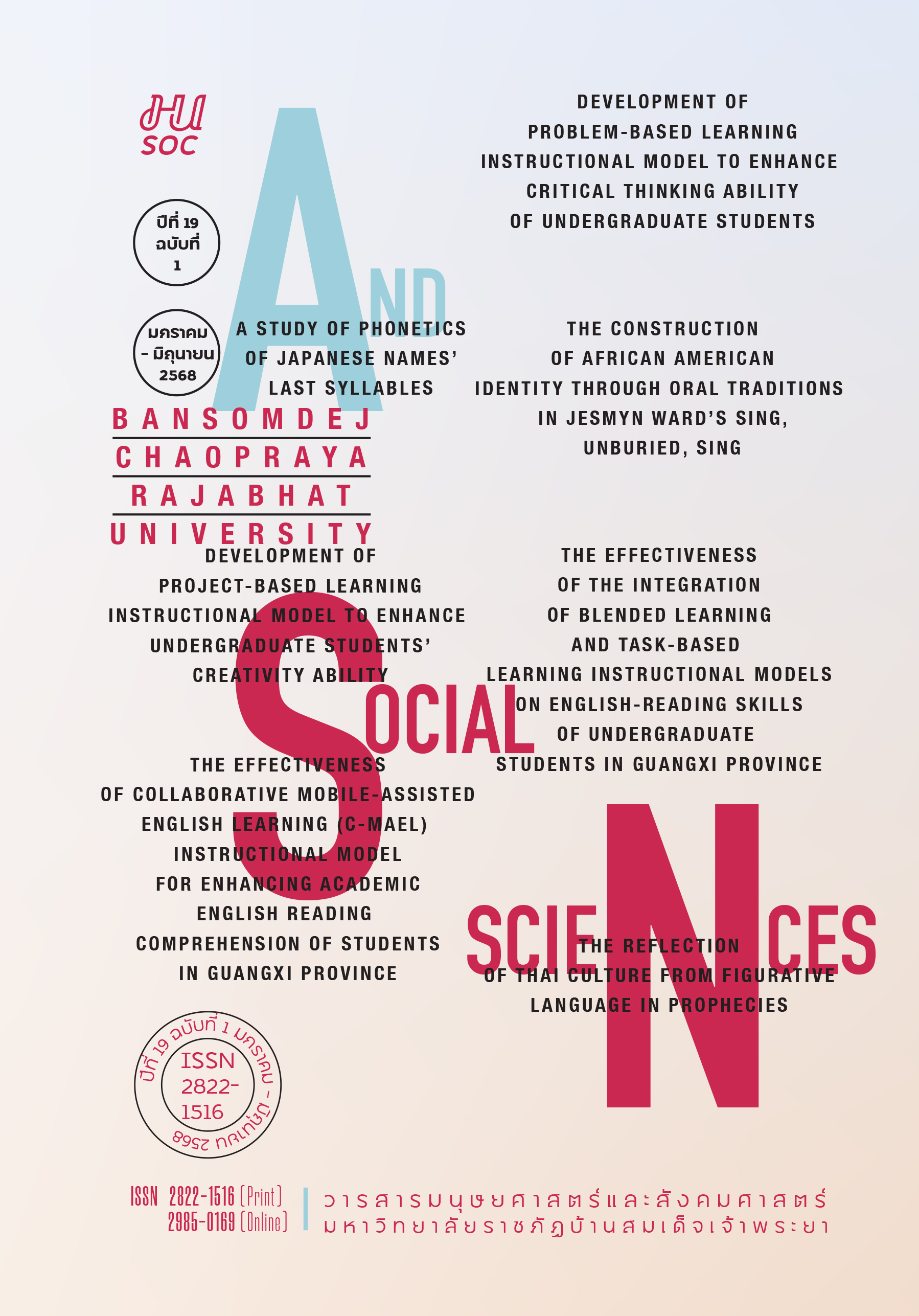Constructing African American Identity through Oral Traditions in Jesmyn Ward’s Sing, Unburied, Sing
คำสำคัญ:
African American Identity, Oralityบทคัดย่อ
The objective of this research article was to examine the role of oral traditions in constructing the African American identity of the main character, Jojo, in the novel Sing, Unburied, Sing (2017). This research employed a qualitative methodology to analyze how oral traditions contributed to the formation of African American identity.The findings of this study indicate that the character could shape African American identity by recounting the experiences of slavery. The slave history had been retold, providing an opportunity for the protagonist, who was of African American descent, to reinterpret the experience of slavery. Additionally, it prompted a reevaluation of the historical context of slavery. The protagonist could form their identity by reconciling the cultural differences between their ancestors’ culture and the dominant mainstream culture and could live in an American society as an African American descendant.
เอกสารอ้างอิง
Adedeji, J. A. (1971). Oral tradition and the contemporary theatre in Nigeria. Research in African Literatures, 2(2),134-149.
Bastide, R. (1960). Les Religions africaines au Brésil: vers une sociologie des interpénétrations de civilisations. Presses Universitaires de France.
Bausch, W. J. (1999). Storytelling: Imagination and Faith. Twenty-Third Publications.
Brogan, K. (1995). American Stories of Cultural Haunting: Tales of Heirs and Ethnographers. College English, 57(2), 149-165.
Choden, K. (1994). Folktales of Bhutan. White Lotus.
Cucarella-Ramon, V. (2020). “Biblical Echoes and Communal Home in Jesmyn Ward’s Salvage the Bones.” Miscellanea: A Journal Miscellaneal of English and American Studies, 62, 91-107.
Darkwa, A. (1987). Culture and Communication: Music, Song and Dance as Mediums of Communication in Africa. University of Nairobi Institute of African Studies.
Gordon, A. F. (1997). Ghostly Matters: Haunting and the Sociological Imagination. U of Minnesota P.
Graham, M., & Ward, J. W. (2015). The Cambridge History of African American Literature. Cambridge University Press.
Gunner, L. (2004). The Cambridge History of African and Caribbean Literature. ed. By Irele, A., & Gikandi, S. Cambridge University Press.
Hartman, S. (2007). Lose Your Mother: A Journey along the Atlantic Slave Route. Farrar, Straus, and Giroux.
Harris, T. (1994). Fiction and Folklore: The Novels of Toni Morrison. University of Tennesses Press.
John, C. A. (2004). Clear Word and Third Sight: Folk Groundings and Diasporic Consciousness in African Caribbean Writing. Duke University Press.
Khedhir, Y. (2020). Ghosts Tell Stories: Cultural Haunting in Jesmyn Ward’s Sing, Unburied, Sing. British and American Studies, 26, 17-23.
Mahfouf, F., & Al-Shetawi, M. F. (2019). Oral Storytelling: Resistance and Freeing Voices from the Deep South in Ernest Gaines’s A Gathering of Old Men. International Journal of Arabic-English Studies (IJAES), 19(2), 427-445.
Mellis, J. (2019). “Continuing Conjure: African-Based Spiritual Traditions in Colson Whitehead’s The Underground Railroad and Jesmyn Ward’s Sing, Unburied, Sing.” Religions, 10(7), MDPI Journals, www.mdpi.com/2077-1444/10/7/403.
Morrison, T. (1987). Beloved. Penguin Books.
Peterson, N. J. (1998). Toni Morrison: Critical and Theoretical Approaches. The Johns Hopkins University Press.
Quayson, A. (2009). The Cambridge Companion to the African Novel. ed. By Irele, A., & Gikandi, S. Cambridge University Press.
Ricoeur, P. (2004). Memory, History, Forgetting. Translated by Kathleen and David Pellauer. University of Chicago Press.
Roach, J. (1996). Cities of the Dead: Circum-Atlantic Performance. Columbia UP.
Sackey, E. (1991). ‘Oral tradition and the African novel’. Modern Fiction Studies. 37(3), 389-407. http://doi.org/10.1353/mfs.0.0987
Tally, J. (2009). Beloved: Origins. Routledge.
Ward, J. (2017). Sing, Unburied, Sing. Scribner.
Warner-Lewis, M. (2004). The oral tradition in the African diaspora. In Simon Gikandi, et al. (Eds.), The Cambridge History of African and Caribbean Literature, Vol.1 (pp.117-36). Cambridge University Press.
Wright, R. (1971). ‘Blueprint for Negro Literature’, in Amistad 2: Writings on Black History and Culture, ed. by John A. Williams and Charles F. Harris.Vintage Books.
ดาวน์โหลด
เผยแพร่แล้ว
รูปแบบการอ้างอิง
ฉบับ
ประเภทบทความ
สัญญาอนุญาต
ลิขสิทธิ์ (c) 2024 คณะมนุษยศาสตร์และสังคมศาสตร์ มหาวิทยาลัยราชภัฏบ้านสมเด็จเจ้าพระยา

อนุญาตภายใต้เงื่อนไข Creative Commons Attribution-NonCommercial-NoDerivatives 4.0 International License.




